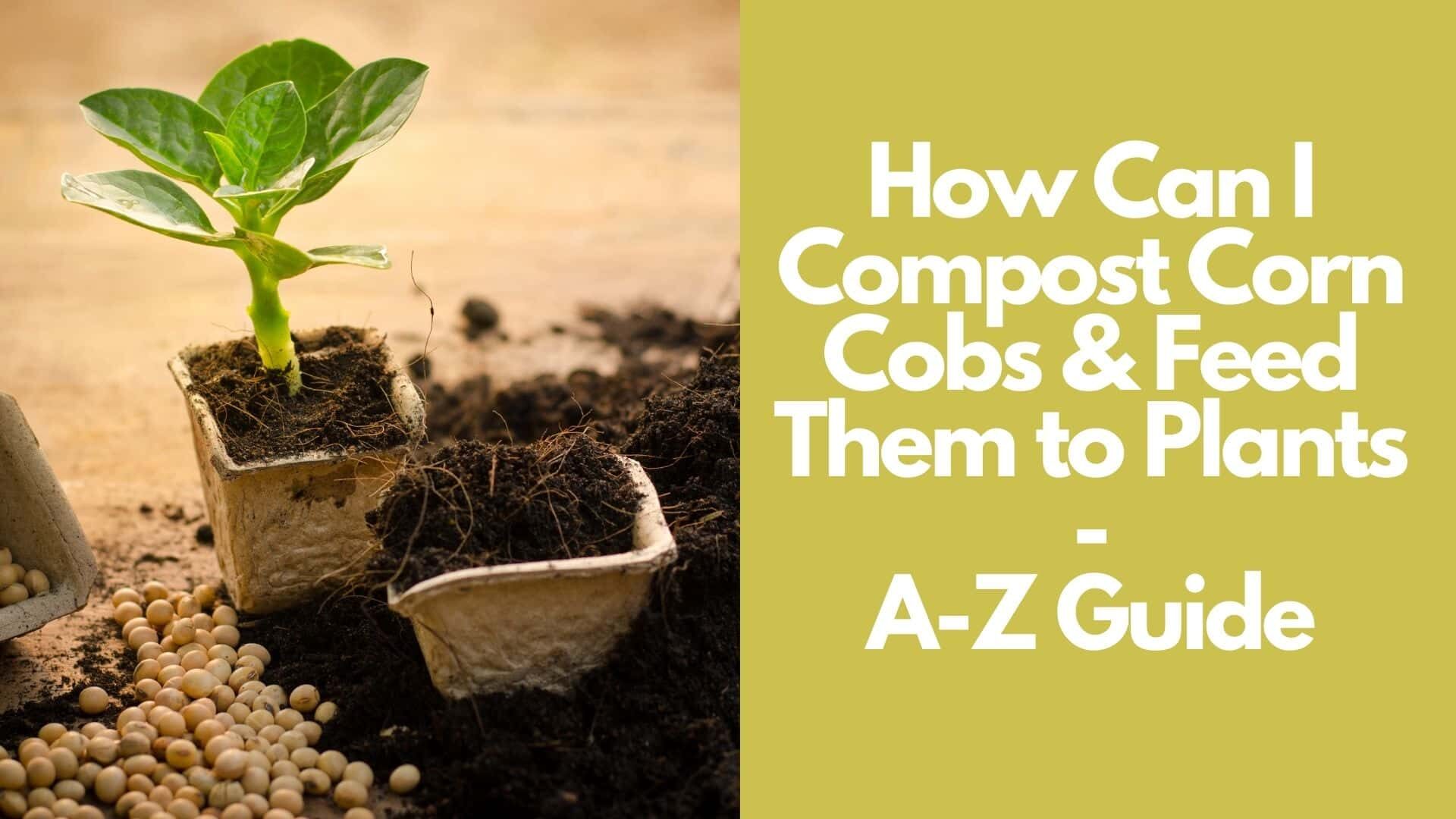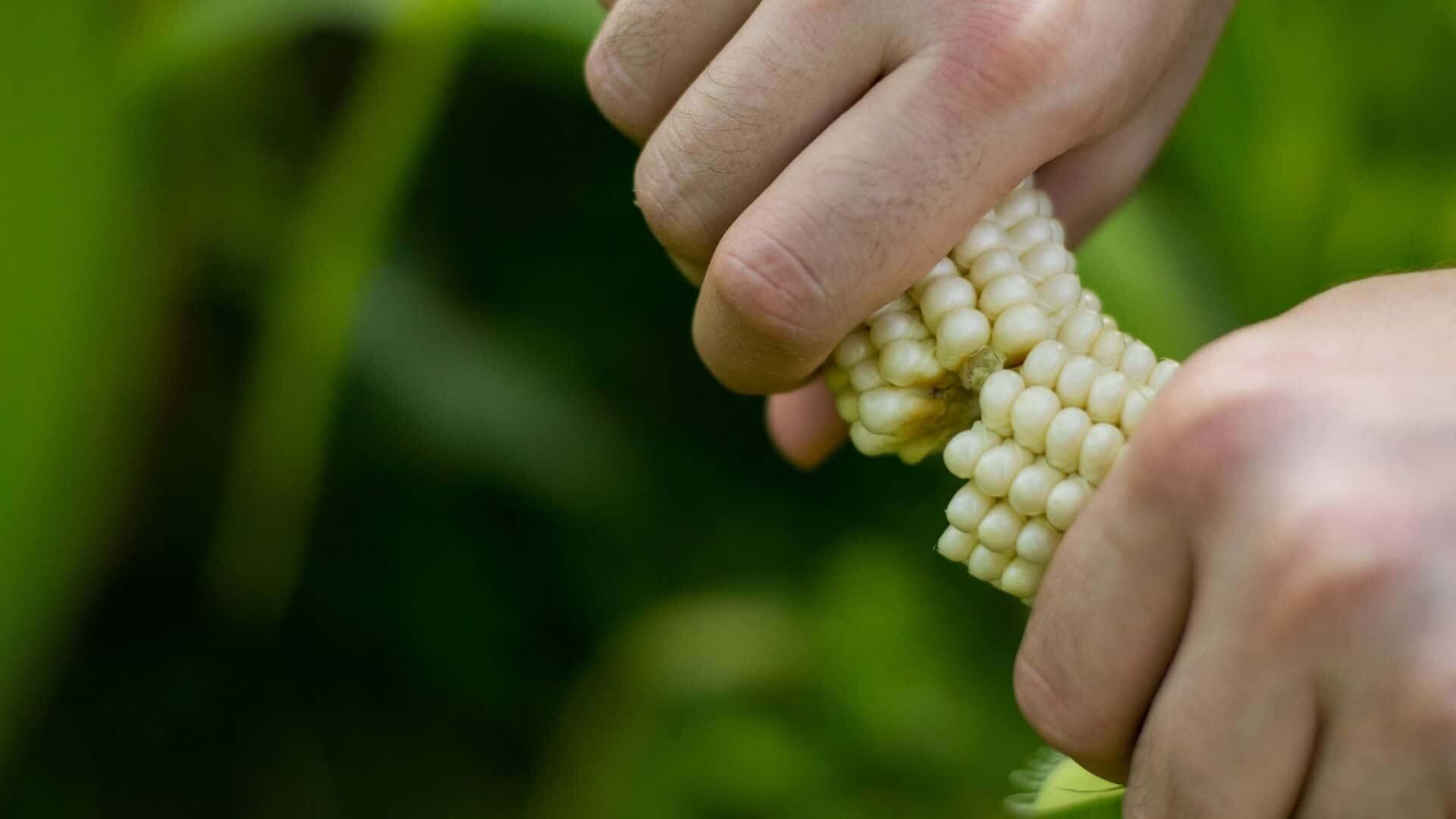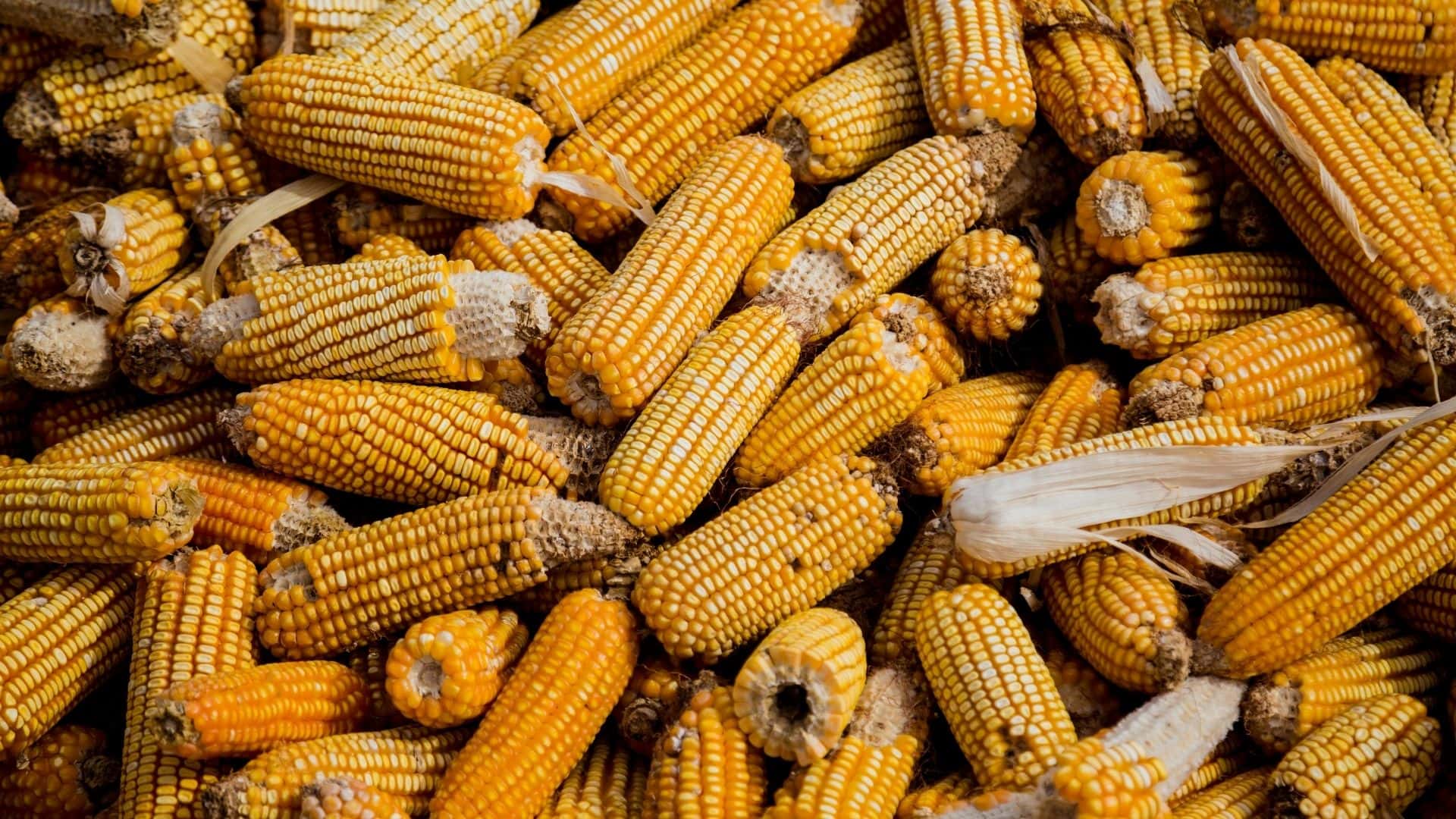Turn kitchen scraps into garden gold by composting corn cobs. How can I compost corn cobs? Composting corn cobs the right way can improve soil health. Find out if you can compost them and how to use them in your garden.
You may wonder what to do with the corn cobs you ate after your favorite food dinner when you’re putting out your food waste. It’s time to find out if corn cobs can compost and how to dispose of them when eliminating food waste for a healthy compost with a ratio formula of compost ingredients because so much cobbled corn is consumed every day. In fact, composting is a low-cost, natural process. It’s easy to make as well as to use. Is it possible to compost corn cobs? Exactly yes.
Composting corn cobs is an environmentally friendly way to turn kitchen scraps into nutrient-rich soil amendments. The cobs, stalks, leaves, and even the husks of the corn plant can use in your compost pile.
In addition to adding air pockets to a compost pile, using whole corn cobs can hasten the decomposition process. Maintaining a small or large cornfield is also simple. They enrich the soil with organic materials when composted properly. By reading this guide, you will be able to know, How Can I Compost Corn Cobs and Feed Them to Plants Strong.

Let’s start,
Can I compost corn cobs?
Composting the corn cobs after the harvest is easy to tidy up after the period end. It’s common for food waste to be left behind. So, it’s usually compostable. Corn cobs are a great addition to compost piles.
There is no odor. Corn cobs can decompose because they are food waste. Fruit flies and other pests won’t be attracted to the sweet flavor of corn cobs, either. As a result, they won’t decompose as quickly as other compost items such as vegetable scraps, leftover food, and yard trash.
Rotting corn cobs can also compost. These are, in fact, excellent additions to the compost heap. Decomposition will be faster because they’re already deteriorating.
Decomposition, of course, has no negative impact on the environment. When you compost corn cobs, the nutrients in the cobs will slowly release over time, supplying your soil with a steady supply of nutrients.
When your compost pile breaks down, the cobs add a unique texture and structure. Changes in breakdown and moisture content can influence by this method. For example, they provide a good source of nutrients for the soil or plants.
Even if you don’t have a garden of your own, you can add some corn cobs to the food waste you’ll be bringing to your local curbside compost. It doesn’t have a foul odor as it’s decomposing, making it a good choice for a compost pile at home or on the curb.
Are cooked corns compostable?
Corn is an excellent source of protein, and it may prepare in various ways. However, you can’t eat your entire body at once. You can’t consume the fried cobs; only the kernels will be edible. In this case, which bin is best for a batch of roasted corn cobs is up for debate.
You may use your garden’s compost pile or a compost bin for composting them. Cooked corn cobs make composting a lot easier because they retain moisture from the cooking process.
Compared to the uncooked version, they are much softer and degrade even more quickly. The air pockets that the kernels used to be attached to will assist speed the decomposition of the remainder of your compost.
The air trapped in these pockets with the moisture, heat, and microbes necessary to hasten decomposition. It will generate organic fertilizer ready for application to your soil and plants.
What are the steps of composting corn cobs?
To reduce kitchen waste and produce a rich garden amendment as soon as possible is the purpose of composting. You should follow these steps to compost corn cobs.
1. Select the right compost bin and location.
Compost bins come in all shapes and sizes, so be sure yours is ideal. To avoid roasting, you should not cover the bottom of the pile. In addition, it must build in an area that receives a lot of sunlight and fresh air.
2. Chop up the corn cobs.
Reduce the size of your corn cobs by chopping them up. If they are smaller, they are easier to break down and begin to release nutrients into the soil more quickly. A faster decomposition rate can achieve by cutting the material into smaller pieces.
When you cut the corn cobs into small pieces, they won’t take up a lot of space in the compost heap. Instead, the smaller chunks will be happy to mix together and make smaller air pockets that make the whole process of decomposition go much faster. So you don’t have to worry about big chunks of corn cob stalks sticking out of your garden.
Cutting corn cobs can be dangerous if you’re not careful, so take your time. Typically, they are hard to cut through and can cause a knife to slide when wet.

3. Add materials to the compost pile.
The proper proportion of green and brown organic materials should contain in your compost pile. For best performance, compost should maintain a 4:1 ratio of “brown” to “green” components.
Grass clippings, kitchen waste, fresh leaves, coffee grounds, and other fresh materials name green materials. Nitrogen can find in abundance in green materials. Corn cobs and husks, shredded leaves, wood chips, and other dried materials are among the brown material’s components.
Adding too much green to the compost will make it overly wet, which will result in unpleasant odors and suffocate the microorganisms and fungus that feed on it.
The compost will dry out and stop breaking down organic matter if too much brown adds to the pile. Moisture meters are the best way to know the moisture level.
4. Water the pile.
Spray water on the pile. The microorganisms in your compost pile will drown if you add too much water. If this occurs, you won’t be able to use your compost.
A compost thermometer is a great way to ensure that your pile is adequately decomposing. Or, you can put your hand in the center of the pile. The temperature of your compost pile should be consistent with that of the surrounding soil.
Cooked corn cobs should not be over-dried. When you add them while they are still damp, you want them to keep that moisture. Degradation and composting will slow down if the materials are allowed to dry out.
5. Turn the compost pile.
Compost turning is just as important as balancing materials for the breakdown of maize cobs and husks. Compost pile turning raises heat and speeds decomposition by introducing fresh air to the pile.
Regularly mixing the compost every two or three days will speed up the composting process and improve the final product’s quality. There is a risk of decomposition and an unpleasant odor if you do not stir it. Making your compost healthy has additional advantages.
6. Feed your garden.
Compost can be fed to the garden when it is dry, brown, crumbly, and no longer emits heat. You should add 4 to 6 inches of compost to your flowerbeds and containers at the start of each growing season.
Is it possible to compost other parts of a corn plant?
You can compost every part of the corn plant. Composting leaves, husks, and even the stalks of corn is also a better option.
How to compost corn husks?
As far as composting goes, you may use corn husks as well. Corn cobs are thicker than husks. On the other hand, husks cannot eat.
Using fresh or dried husks is an excellent way to compost. Aside from the husks, the corn cobs are protected against pests and insects by their abundance. Harvesting involves removing the husks to uncover the corncobs, which creates a sloppy mess that must clean up.
Your garden soil and plants will benefit from using corn husks, They are a natural source of fertilizer. It helps to save money because you’re reducing your fertilizer prices and utilizing only organic fertilizers in your garden.
If you get corn husks from the market or your own garden, they can be green. It’s true that you won’t always have new corn husks, but you can also compost the brown ones.
It is good to use both of them in the compost pile. Husks break down much faster than corn cobs will. Each one will help to make compost that is rich in nutrients.
How to compost corn stalks?
Composting corn stalks is an option. Before adding to the compost pile, it is better to chop up these stalks to avoid clogging.
Compost heaps benefit from the addition of nutritious corn plants, which are an excellent choice for organic material additions. Corn cobs and stalks contain a lot of carbon. It makes them a good source of carbon for composting, while the leaves and husks are a good source of nitrogen.
If you don’t want to compost your corn plants, you can mulch them instead. You can chop off the stalks and leaves of your corn and leave them on top of the soil to re-introduce the nutrients back into the soil as you harvest it.
When do corn cobs decompose?
Corn cobs decompose in just 2 months in a compost bin. They can take around 15 to 18 years to decompose in a landfill.
The different gases cause variation in the breakdown time of corn cobs in various processes. About half of the landfill gas is carbon dioxide, and the other half is methane. The anaerobic breakdown of corn cobs in the landfill produces methane. Compost pile decomposes aerobically, releasing carbon dioxide into the atmosphere as a result of the process.
How do I feed plants with corn cob compost?
When compost turns a dark brown and crumbles to a fine powder, it’s ready for usage. After finishing, there should be no traces of organic materials left behind.
Once you’ve used the corn cob compost you’ve made, you can give it back to your plants as fertilizer. Compost piles with corn cobs add structure and, allow the soil to organically aerate. That enriches the soil’s nutrients and promotes air circulation in your garden.
Make sure the compost is periodically mixed and evenly distributed if you intend to keep your corn cobs at their regular size. Overcrowding an area with cornstalks might slow down the decomposition process.
After decomposing to the desired level, compost corn husks and compost corn cobs can mix into your garden’s soil. If your corncobs haven’t decomposed to your satisfaction, toss them back in the bin and, the composting process will continue.
Adding corn cobs to your garden soil is an excellent way to enrich the soil with nutrients such as nitrogen and phosphorus as well as calcium, magnesium, and sulfur. Composting with corn cobs is also a great option.
What are the advantages of using corn cubs as compost?
There are so many advantages of corn cobs compost. A few of them have been mentioned below.
1. Boosts the health of plants.
Plants benefit from the nitrogen that corn cobs add to the soil. Fertilizer made from corn cobs can use in gardens and farms. A wide variety of plants can benefit from corn cobs.
After the harvest, the corn stalks dry to make corn cobs. Barns and warehouses use to store dried corn cobs. They provide plants with nutrients, which aids in their overall health.
2. Helps to feed bacteria.
Corn cobs add lignin and other compounds that feed the bacteria in the compost will help them thrive.
3. Helps with aeration.
The breakdown process aids by the addition of aeration. It’s a good idea to use corn cobs because they have air pockets. Compost materials are ready for usage in a short time when combined with additional elements such as high heat, moisture, and bacteria.
Biodegradation of corn cobs takes a very long time. Since they have air pockets, you can use them again and again. Composting is as easy as sifting the decomposing material through a sieve and starting a new batch.
4. Rich in carbon source.
For healthy plants and soil, adequate carbon requires. Too much of anything is harmful, and this includes carbon content. Composting corn cobs provides the perfect balance of carbon and nitrogen.
Corn cobs, in general, are a great addition to your garden. Additionally, they give an additional and distinct service as a fertilizer source. Think to consider composting your corn cobs before you throw them out the next time.
5. Serves as bulk to soil.
Corn cobs are heavier than other compost ingredients. Because of their greater mass, they are an excellent source of bulk material for your compost pile. In addition, they decay more slowly than other compost materials, so you can reuse them more than once before they dissolve completely.
Corn cobs can also use to add bulk to the soil. To increase the nutrients and improve the texture of the soil, you can appropriately combine it with clayey soil.
6. Acts as mulch.
You can mulch corn cobs with silks, kernels, leaves, and even the corn grain itself, or use any portion of the corn cob for this purpose. The mulch can be made more nutrient-rich by adding corn cobs and other organic items to it, as well.
7. Maintains the right amount of brown and green material.
8. Enhances the final product’s texture.
What are the disadvantages of composting corn cobs?
Whole corn cob pieces can take several seasons to decompose in the compost. Fresh or dried, breaking down corn is difficult but not impossible. Throwing the half-cob leftovers into a new batch is an option if your compost is otherwise complete. You’ll want to break down corn into smaller bits to decompose more quickly.
Watch How to compost corn stalks | Video
Top 5 FAQs & answers related to how can I compost corn cobs & feed them to plants
Do worms eat corn cobs?
The texture of raw maize makes it difficult for worms to eat quickly. That explains why they don’t seem to enjoy them, but when we cook or grill them, worms and decomposers love them. You can also use it in the worm bin.
Is the compost made from corn cobs dark or green?
Corn husks are a good source of green material for a fast-decomposer compost pile. Compost piles need a mixture of wet, fresh plant matter and dry, brown stuff to function properly.
How do corn cobs decompose in the compost pile?
You need to see nature’s natural decomposition process to comprehend composting. For example, trees and leaves are abundant in forests and wooded places.
Organic elements are broken down or decomposed by microbes and earthworms over time. Humus generates when these materials are broken down. It is impossible to grow healthy plants without humus, which is a vital component of rich, fertile soil.
Is an open or closed compost bin good for corn cobs?
Both can readily benefit from the addition of corn cob stalks, but larger open compost bins will not require the cobs to be shredded. There is no definitive answer here.
This is because these bins can accommodate longer cob stalks. After all, they include more materials that are composting. Corn cob stalks, on the other hand, are an excellent source of big air pockets.
Do corn cobs make fertilizer?
Corn cobs, in general, are a great addition to your garden. Additionally, they give an additional and distinct service as a fertilizer source. Think to consider composting your corn cobs before you throw them out the next time.
Conclusion
By reading this guide, I hope you got the full idea of How Can I Compost Corn Cobs and Feed Them to Plants Strong.
Please share this How Can I Compost Corn Cobs and Feed Them to Plants Strong with your friends and do a comment below about your feedback.
We will meet you on next article.
Until you can read, Why Are My Tomato Leaves Turning Purple: Guide with Reasons
